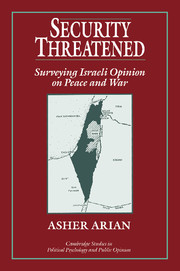4 - Change in Security Attitudes
Published online by Cambridge University Press: 06 July 2010
Summary
ATTITUDES
It has been a truism of Israeli life since the Six Days war that the public was split between a more militant and a more conciliatory stand on the political and security issues that confront the state (Shamir 1986; Yishai 1987). But it was equally true that support for the more dovish positions grew over the years, especially after 1987. It is certain that this creeping conciliation coincided with the onset of the intifada and with the Gulf war, but it is not possible to prove that any single occurrence caused this trend. These events were evidently associated with surges in the attitudes of Israelis; acts of terror tended to stem the incremental change afoot in this period; most other events, however, accelerated moderating processes already under way.
Issues of national security are notoriously complex. On the enigmatic and emotion-laden issues of Israeli national security, and the territories and the inhabitants living there, it is probably accurate to point out that in addition to the Israeli polity being divided, Israelis within themselves are also conflicted. The issues are not simple and the ramifications are enormous. Hence, discrete questions often used to gauge the public's views on national security and the direction and extent of attitude change may be found lacking (Verba and Brody 1970). Single-variable indicators of attitudes and attitude shifts may give misleading indications of change (Converse 1964), since the underlying forces are likely to be much more intricate (Holsti and Rosenau 1984).
- Type
- Chapter
- Information
- Security ThreatenedSurveying Israeli Opinion on Peace and War, pp. 91 - 128Publisher: Cambridge University PressPrint publication year: 1995



